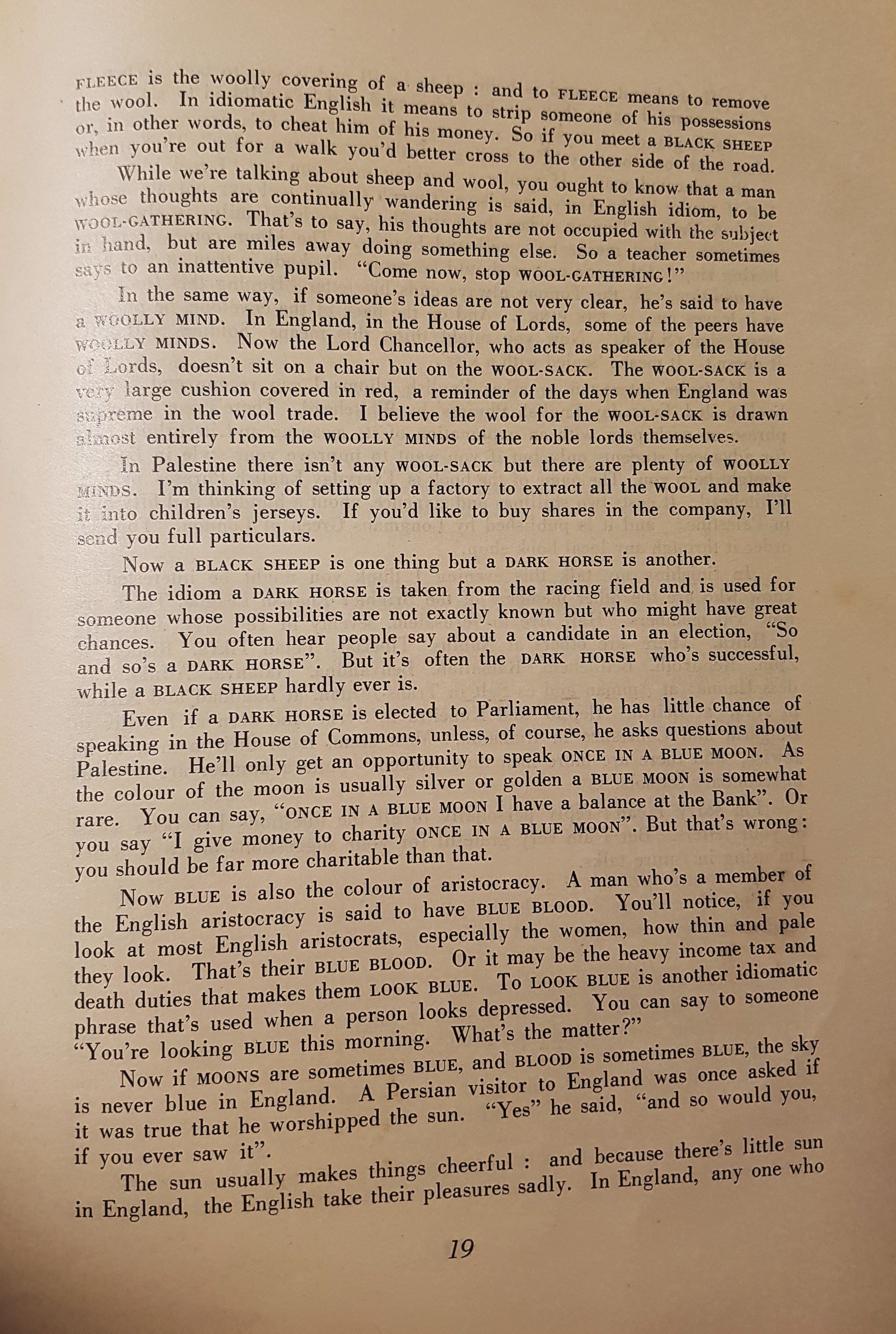|
Let's Speak English
| Contents | Previous Page | Next Page | - Page 19 - FLEECE is the woolly covering of a sheep: and to FLEECE means to remove the wool. In idiomatic English it means to strip someone of his possessions or, in other words, to cheat him of his money. So if you meet a BLACK SHEEP when you're out for a wlk you'd better cross to the other side of the road While we're talking about sheep and wool, you ought to know that a man whose thoughts are continually wandering is said , in English idiom, to be WOOL-GATHERING. That's to say his thoughts are not occupied with the subject in hand, but are miles away doing something else. So a teacher sometimes says to an inattentive pupil. "Come now, Stop WOOL-GATHERING!". In the same way if ' someone's ideas are not very clear, he's said to have WOOLLY MINDS. In England, in the House of Lords, some of the peers have WOOLY MINDS. Now the Lord Chancellor, who acts as speaker of the House of Lords, doesn't sit on a chair but on the WOOL-SACK. The WOOL-SACK is a very large cushion covered in red, a reminder of the days when England was supreme in the wool trade. I believe the wool for the WOOL-SACK is drawn almost entirely from the WOOLLY MINDS of the noble lords themselves. In Palestine there isn't any WOOL-SACK but there are plenty of WOOLLY MINDS. I'm thinking of setting up a factory to extract all the WOOL and make it into children's jerseys. If you'd like to buy shares in the company, I'll send you full particulars. Now a BLACK SHEEP is one thing but a DARK HORSE is another. The idiom a DARK HORSE is taken from the racing field and, is. used for someone whose possibilities are not exactly known but who might have great chances. You often hear people say about a candidate in an election "So and so's a DARK HORSE". But it's often the DARK HORSE who's successful. while a BLACK SHEEP hardly ever is. Even if a DARK HORSE is elected to Parliament, he has little chance of speaking in the House of Commons, unless, of course, he asks questions about Palestine. He'll only get an opportunity to speak ONCE IN A BLUE MOON. As the colour of the moon is usually silver or golden a BLUE MOON is somewhat rare. You can say, "ONCE IN A BLUE MOON I have a balance at the Bank". Or you say "I give money to charity ONCE IN A BLUE MOON". But that's wrong: you should be far more charitable than that. Now BLUE is also the colour of aristocracy. A man who's a member of the English aristocracy is said to have BLUE BLOOD. You'll notice, if you look at most English aristocrats, especially the women, how thin and pale they look. That's their BLUE BLOOD. Or it may be the heavy income tax and death duties that makes them LOOK BLUE. To LOOK BLUE is another idiomatic phrase that's used when a person looks depressed. You can say to someone "You're looking BLUE this morning. What's the matter?" Now if MOONS are sometimes BLUE, and BLOOD is sometimes BLUE, the sky is never blue in England. A Persian visitor to England was once asked if it was true that he worshipped the sun. "Yes" he said, "and so would you, if you ever saw it". The sun usually makes things cheerful: and because there's little sun in England, the English take their pleasures sadly. In England, any one who 19 |

|
|
| Contents | Previous Page | Next Page |